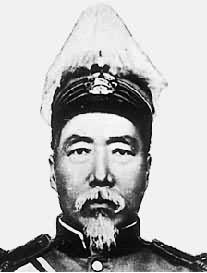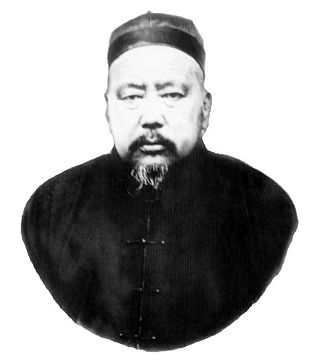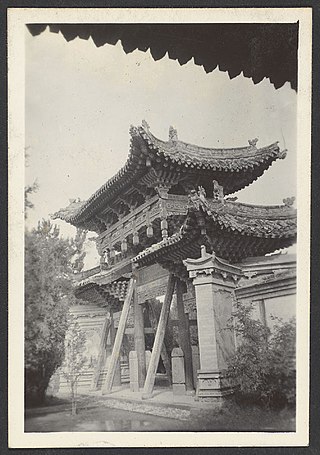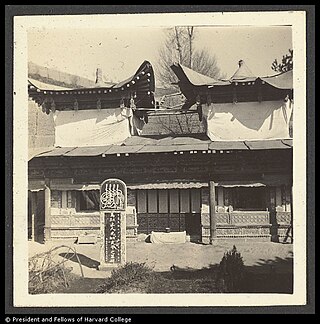
Yang Zengxin was a Chinese warlord who was the ruler of Xinjiang after the Xinhai Revolution in 1911 and during the Warlord Era until his assassination in 1928.
The Ma clique or Ma family warlords is a collective name for a group of Hui warlords in Northwestern China who ruled the Chinese provinces of Qinghai, Gansu and Ningxia for 10 years from 1919 until 1928. Following the collapse of the Qing dynasty in 1912, the region came under Chinese Muslim warlord Ma Qi's control until the Northern Expedition by the Republic of China consolidated central control in 1928. There were three families in the Ma clique, each of them respectively controlled, parts of Gansu, Ningxia and Qinghai. The three most prominent members of the clique were Ma Bufang, Ma Hongkui, and Ma Hongbin, collectively known as the Xibei San Ma. Some contemporary accounts, such as Edgar Snow's, described the clique as the "Four Ma", adding Ma Bufang's brother Ma Buqing to the list of the top warlords. Other prominent Ma's included Ma Anliang, Ma Qi, Ma Lin, Ma Hu-shan, and Ma Zhongying.

Ma Qi was a Chinese Muslim General in early 20th-century China.

Ma Fuxiang was a Chinese Muslim scholar and military and political figure, spanning from the Qing Dynasty through the early Republic of China. His positions illustrated the power of family, the role of religious affiliations and the interaction of Inner Asian China and the national government of China. A prominent Muslim warlord in northwest China, Ma Fuxiang originally served under Dong Fuxiang, like other Ma Clique Muslim warlords such as Ma Anliang.

Lintan County is an administrative district in Gansu, China. It is one of 58 counties of Gansu. It is part of the Gannan Prefecture. Its postal code is 747500, and in 1999 its population was 148,722 people.

Ma Anliang was a Hui born in Hezhou, Gansu, China. He became a general in the Qing dynasty army, and of the Republic of China. His father was Ma Zhan'ao, and his younger brothers were Ma Guoliang and Ma Suiliang 馬遂良. Ma was educated in Chinese and Islamic education. His Muslim name was Abdul Majid.

Hu Songshan (1880–1955), a Hui, was born in 1880, in Tongxin County, Ningxia, China. His Muslim name in Arabic was Sa'd al-Din. Although he was born Sufi and turned Wahhabi, he changed his views and turned his back on Wahhabism after a Hajj to Mecca and later became an important imam, scripturalist, and leader of the Yihewani Muslim sect in China. He was influential and played an important role in Chinese Islam in this position as he propagated reformist doctrines in Ningxia in his later life. Hu also played a role in rallying Muslims against the Japanese invasion of China.
Yihewani, or Ikhwan, is an Islamic sect in China. Its adherents are called Sunnaiti. It is of the Hanafi school, one of the four major schools of Sunni Islam. It is also referred to as "new teaching" or "latest teaching". Ikhwan (Yihewani), together with Qadim (Gedimu) and Xidaotang, are the three major sects of Islam in China. The Yihewani sect was labeled as the new teaching (xinjiao). In 1937 it divided into two groups.

Xidaotang --originally called Jinxingtang 金星堂, the "Gold Star Hall"; also called the Hanxue pai 汉学派, the "Han Studies Sect" —is a Sino-Islamic religious body / special economic community centered in Gansu province. The Xidaotang is mainly distributed in Lintan and Hezheng County in Gansu, and also has followers in Qinghai, Xinjiang, and Sichuan.
Ma Zhan’ao (1830–1886) was a Chinese Muslim General who defected to the Qing Dynasty in 1872 during the Dungan revolt along with his General Ma Qianling and General Ma Haiyan who served under him during the revolt. He first sent Ma Chun to negotiate a surrender with General Zuo, but Zuo suspected a ruse. Ma then sent his son, Ma Anliang, to negotiate. He then assisted General Zuo Zongtang in crushing the rebel Muslims. In 1877 he and Ma Qianling expelled Muslim rebels who refused to give up from the hills surrounding Hezhou. He had three sons, Ma Anliang, Ma Guoliang, and Ma Suiliang 馬遂良. The escape of Han people from Hezhou during the rebellion was assisted by Ma Zhan'ao.
Ma Fulu, a Chinese Muslim, was the son of General Ma Qianling and the brother of Ma Fucai, Ma Fushou and Ma Fuxiang. He was a middle born son.
Tang Yanhe a Han chinese, was born Gansu, China. He commanded an army of Chinese Muslim soldiers along with Dong Fuxiang, and used them to crush the Muslim Rebellion of 1895.
Ma Dahan was a Dongxiang Muslim who rebelled against the Qing dynasty in 1895. Ma Dahan arranged a deal with the fellow Dongxiang Ma Wanfu when rebelling against the Qing dynasty. In Hezhou, Didao, and Xunhua they directed their adherents to join the rebellion. Guanghe, Sanjiaji and Tiaoheyan were agreed upon as points in a defensive position, and they pledged that they would not surrender. Ma Wanfu betrayed Ma Dahan since he surrendered as the Chinese Muslim loyalist General Ma Anliang and Dong Fuxiang arrived to crush the rebel Muslims and Ma Dahan was killed while fighting to the death.
Ma Yonglin was a Chinese Muslim leader of the Multicoloured Mosque who participated in the Dungan revolt and the Muslim revolt of 1895 against the Qing dynasty. He antagonized mobs of Hui, Dongxiang, Baoan, and Salars to overthrow the Qing dynasty in Xunhua, Qinghai. Brigadier General Tang Yanhe sent soldiers to defeat the rebels. He belonged to the Khafiya Sufi sect. Ma Yonglin led assaults on Qing forces. Loyalist Chinese Muslims like Dong Fuxiang, and Ma Anliang defeated Ma Yonglin's rebel Muslim forces. Chinese Muslim officers like Ma Fulu and Ma Fuxiang opposed the rebel Muslims, and defeated them in combat.

The Dungan Revolt (1895–1896) was a rebellion of various Chinese Muslim ethnic groups in Qinghai and Gansu against the Qing dynasty, that originated because of a violent dispute between two Sufi orders of the same sect. The Wahhabi inspired Yihewani organization then joined in and encouraged the revolt, which was crushed by loyalist Muslims.

Ma Qixi, a Hui from Gansu, was the founder of the Xidaotang, a Chinese-Islamic school of thought.

Ma Yuanzhang was a Chinese Sufi master, of the Jahriyya menhuan.
The Muslim Conflict in Gansu broke out when a coalition of Muslim generals revolted against the Guominjun in 1927. Prominent among the rebels was Ma Tingxiang, the son of the General Ma Anliang, who received aid in the form of arms from Zhang Zuolin in Manchuria.
The vast majority of China's Muslims are Sunni Muslims, although a small minority are Shia.

Sailaifengye or Salafiyah refers to the Chinese Salafi Movement.










